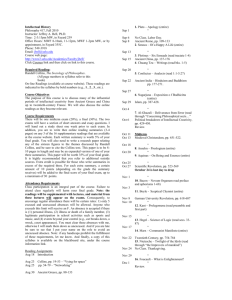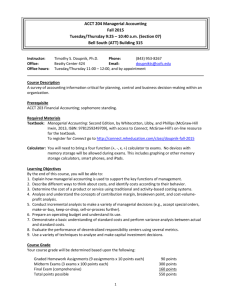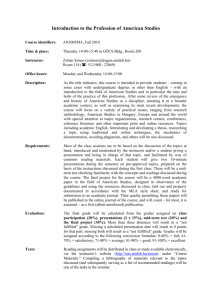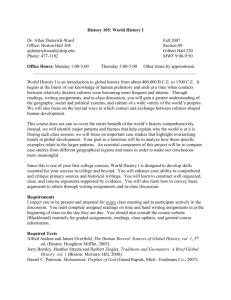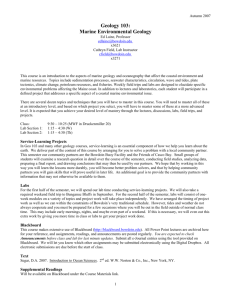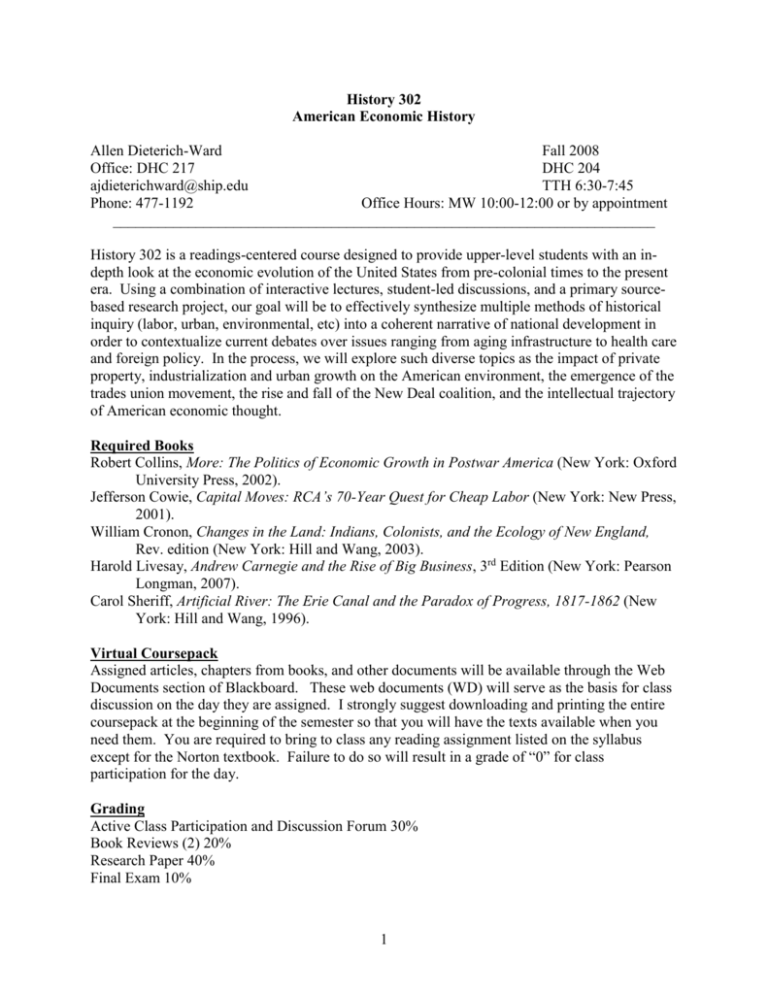
History 302
American Economic History
Allen Dieterich-Ward
Fall 2008
Office: DHC 217
DHC 204
ajdieterichward@ship.edu
TTH 6:30-7:45
Phone: 477-1192
Office Hours: MW 10:00-12:00 or by appointment
________________________________________________________________________
History 302 is a readings-centered course designed to provide upper-level students with an indepth look at the economic evolution of the United States from pre-colonial times to the present
era. Using a combination of interactive lectures, student-led discussions, and a primary sourcebased research project, our goal will be to effectively synthesize multiple methods of historical
inquiry (labor, urban, environmental, etc) into a coherent narrative of national development in
order to contextualize current debates over issues ranging from aging infrastructure to health care
and foreign policy. In the process, we will explore such diverse topics as the impact of private
property, industrialization and urban growth on the American environment, the emergence of the
trades union movement, the rise and fall of the New Deal coalition, and the intellectual trajectory
of American economic thought.
Required Books
Robert Collins, More: The Politics of Economic Growth in Postwar America (New York: Oxford
University Press, 2002).
Jefferson Cowie, Capital Moves: RCA’s 70-Year Quest for Cheap Labor (New York: New Press,
2001).
William Cronon, Changes in the Land: Indians, Colonists, and the Ecology of New England,
Rev. edition (New York: Hill and Wang, 2003).
Harold Livesay, Andrew Carnegie and the Rise of Big Business, 3rd Edition (New York: Pearson
Longman, 2007).
Carol Sheriff, Artificial River: The Erie Canal and the Paradox of Progress, 1817-1862 (New
York: Hill and Wang, 1996).
Virtual Coursepack
Assigned articles, chapters from books, and other documents will be available through the Web
Documents section of Blackboard. These web documents (WD) will serve as the basis for class
discussion on the day they are assigned. I strongly suggest downloading and printing the entire
coursepack at the beginning of the semester so that you will have the texts available when you
need them. You are required to bring to class any reading assignment listed on the syllabus
except for the Norton textbook. Failure to do so will result in a grade of “0” for class
participation for the day.
Grading
Active Class Participation and Discussion Forum 30%
Book Reviews (2) 20%
Research Paper 40%
Final Exam 10%
1
Assignments
Active Class Participation
This course places a strong emphasis on active participation during class and energetic
involvement in all course related activities. I will divide class time between lectures, discussion
and student-led presentations. Each week I will evaluate each student’s contribution to class
discussion. While I know that everyone has a different level of comfort in talking during class,
at a minimum, you should plan on trying to make at least one comment during each class
session.
Discussion Forum
In addition to class sessions, I plan on having lively discussion through the online Discussion
Forum. At the beginning of the semester, students will sign up to act as discussion leaders for
two weeks of the term. Discussion leaders will be responsible for composing a list of thoughtful
and detailed discussion questions that address each of the week’s readings and posting it to
Blackboard no later than Tuesday at 8:00 p.m. All students (including the discussion leaders) are
then responsible for composing and posting a 300-word (minimum) response to the questions,
readings, and/or class discussion no later than Wednesday at 8:00 p.m. Each response should be
in paragraph format, contain proper spelling, grammar and punctuation, and demonstrate a deep
engagement with the course themes and specific readings. Students are responsible for readings
all of the posts before class on Thursday.
Book Reviews
During the semester you will complete two 3.5-page (minimum) book reviews. The first review
will focus on William Cronon’s Changes in the Land, while the second will be on a book chosen
from a list of additional readings. The second review will also include an in-class presentation
During the week the second review is due, you will be responsible for giving an oral presentation
(5 min.) on the book during class. Your oral presentation should include an overview of the
book’s content and argument as well as a critique of its strengths and weaknesses. We will
spend considerable time working on these book reviews and I expect you to leave the class with
a clear understanding of how to analyze and evaluate secondary sources. For additional
information on writing book reviews, please see the document “How to Write a (Decent) Book
Review” located in the Assignments section of Blackboard.
Research Paper
The second major writing assignment of the course will be conceptualizing, researching and
writing an 8.5-10 page primary research-driven paper. In completing this assignment, you will
be expected to conduct significant research including but not limited to conducting your own oral
history interviews, visiting archives, and accessing online databases. Your analysis will need to
incorporate secondary sources such as those we will be discussing each week in class. This is a
semester long project that will be broken down into a series of steps as listed on the syllabus and
in the document “Welcome to Your Research Paper” available in the Assignments section of
Blackboard.
Final Exam
2
The final exam will be a take home essay requiring you to synthesize multiple course themes and
topics into a coherent argument about the trajectory of the American economy. I will provide
specific instructions for the final exam during the last week of class.
History 302 Style Guide
All written assignments are required to be completed using double spaced, 12-point Times font
with 1-inch margins. Please consult this History 302 Style Guide available in the Assignments
section of Blackboard for additional instructions on formatting.
Note on Plagiarism
Plagiarism or the “unacknowledged use of another writer’s own words or specific facts or
propositions or materials in your own writing” and other forms of academic dishonesty will not
be tolerated and may result in the failure of the course and/or other sanctions as outlined in the
Shippensburg University “Student Handbook,” pp. 18-21. To help prevent and identify
plagiarism, students will submit papers to Turnitin.com.
Attendance and Late Assignment Policies
Please do not miss class. If you do miss class, you are required to email me with a short
explanation and to complete all assignments in a timely fashion. Any absences above three will
result in a significantly lower class participation grade and may result in the failure of the course.
I will deduct half a letter grade for each day a paper is late and will only allow makeup for inclass presentations at my discretion.
Students with Disabilities
If you need additional assistance with any aspect of the class, please see me as soon as possible.
I will be more than happy to accommodate any reasonable request made well in advance of
assignment due dates.
Week 1---Welcome and Introductions
Aug. 26
Course Introduction: What is Economic History?
In-Class Reading: “David Johnson Remembers Apprenticeship Life in the Artisan Shoe Shop,
1830” & “Computerized Order Taking at McDonald’s, 1988,” both in Boris and
Lichtenstein, eds., Major Problems in the History of American Workers
Aug. 28
Read:
Readin’ and ‘Ritin (Economic History Style)
WD Paul Edwards, “How to Read a Book.”
Changes in the Land, xi-xviii, 171-257 (Foreword, Preface, Afterword, and
Backmatter)
Week 2---Landscapes of Power
Sept. 2
Origins of the American Economy (Lecture)
Read:
Changes in the Land, pp. 3-53 (Chapters 1-3)
WD Benson, ed., Peter Kahn’s Travels in North America, 1937.
Sep. 4
Read:
Taking and Remaking the Land (Discussion)
Changes in the Land, pp. 54-158 (Chapters 4-7)
3
Week 3---The Revolutionary Marketplace
Sep. 9
The Trans-Atlantic World (Lecture)
Read:
Changes in the Land, pp. 159-170 (Chapter 8)
WD A Hudson's Bay Factor Orders Merchandise for His Indian Customers, 1739
Research Project Proposal Due
Sep. 11
Read:
“Common Sense” of (Economic) Independence (Discussion)
WD Breen, “Narrative of Commercial Life: Consumption, Ideology, and
Community on the Eve of the American Revolution,” WMQ, July 1993.
WD Morgan, “Slavery and Freedom: The American Paradox,” JAH June 1972.
Week 4---Transportation and Transformation
Sep. 16
Writing Workshop I
Read:
WD Cronon Reviews (Assignments Section of Blackboard)
WD “How to Write a Book Review” (Assignments Section of Blackboard)
Rough Draft of Book Review Due
Sep. 18
Read:
Banks and Bridges (Lecture)
Artificial River, pp. vii-xx, 3-8, 172-251 (Introduction, Epilogue and Back Matter)
WD John Marshall, McCulloch v. Maryland (1819) and Gibbons v. Ogden (1824).
WD John Quincy Adams, Annual Message to Congress (1825).
Book Review # 1 Due
Week 5---Life and Labor in an Industrializing World
Sep. 23
Artisans and Agrarians (Discussion)
Read:
Artificial River, pp. 9-78 (Chapters 1-3)
WD Dublin, “Women, Work and Protest in the Early Lowell Mills”
Sep. 25
Read:
Slave Labor/Free Labor (Discussion)
Artificial River, pp. 79-171 (Chapters 4-6)
WD Roediger, The Wages of Whiteness
Week 6---The Rise of the Corporation
Sep. 30
Technology and Ideology in the Gilded Age (Lecture)
Read:
Andrew Carnegie, pp. 3-52, 211-214 (Chapters 1-3, Epilogue)
WD Andrew Carnegie, The Gospel of Wealth (1889)
Oct. 2
Read:
Consolidation, Cooperation and Competition
Andrew Carnegie, pp. 53-144
Week 7--- The Origins of Trades Unionism, 1860-1919
Oct. 9
The House of Labor (Lecture)
Read:
Andrew Carnegie, pp. 145-210 (Chapter 9-11)
WD Samuel Gompers, Testimony to the U.S. House of Representatives (1899).
Historiographical Essay Due
4
Week 8--- The Politics and Culture of Industrial America
Oct. 14
World War I and the Great Migration (Lecture)
Read:
WD McCartin, “’An American Feeling’: Workers, Managers, and the Struggle
Over Industrial Democracy in the World War I Era,” in Lichtenstein and Harris,
eds., Industrial Democracy in America.
WD “Letters Home from Black Migrants to the North, 1916-1918,” Scott, ed.,
Journal of Negro History 4 (July 1919).
Oct. 16
Read:
Gender and the State in an Industrial Society (Discussion)
WD Gordon, “Social Insurance and Public Assistance: The Influence of Gender in
Welfare Thought in the United States, 1890-1935,” AHR (Feb., 1992)
Week 9--- The Collapse and Rebirth of American Capitalism
Oct. 21
Populism, Progressivism and the New Deal (Lecture)
Read:
Capital Moves, pp. 1-40 (Introduction and Chapter 1)
WD Preamble of the National Labor Relations Act (1935)
Preliminary Annotated Bibliography Due
Oct. 23
Read:
Public Policy in Depression and War (Discussion)
More, pp. 1-39 (Prologue and Chapter 1)
Capital Moves, pp. 41-72 (Chapter 2)
Week 10--- Suburbs, Sunbelt and the Cold War
Oct. 28
Constructing the Postwar World (Lecture)
Read:
More, 40-67 (Chapter 2)
Oct. 30
Read:
Marketing the American Dream (Discussion)
WD Freund, “Marketing the Free Market: State Intervention and the Politics of
Prosperity in Metropolitan America” in The New Suburban History, Kruse and
Sugrue, eds.
Week 11--- Growth Liberalism and the Urban Crisis
Nov. 4
Race, Politics and the Workplace (Lecture)
Read:
Capital Moves, pp. 73-99 (Chapter 3)
WD “Taylor Rogers Relives the Memphis Sanitation Strike” (1968)
WD Cesar Cavez, Letter to E.L. Barr, Apr. 23, 1969, Christian Century
Nov. 6
Read:
The Crisis of Abundance (Discussion)
More, 68-131 (Chapter 3)
WD Sugrue, "Crabgrass-Roots Politics: Race, Rights, and the Reaction against
Liberalism in the Urban North, 1940-1964, JAH (Sep. 1995).
Week 12---American Business on the World Stage
Nov. 11
Exporting Democracy and Capitalism (Lecture)
Read:
Capital Moves, 100-126 (Chapter 4)
5
Nov. 13
Read:
Competition in a Globalizing Economy (Discussion)
More, pp. 132-166 (Chapter 5)
Capital Moves, pp. 152-179 (Chapter 6)
Research Project Rough Draft/Peer Review Due
Week 13--- “Deindustrialization” and the Collapse of the “New Deal Order”
Nov. 18
Interpreting the 1970s (Lecture)
Read:
Capital Moves, 127-151, 180-209 (Chapters 5, 7 and Epilogue)
WD Daniel Bell, The Coming of Post-Industrial Society, 1973.
Nov. 20
Read:
Reaganomics and the Triumph of Conservatism (Discussion)
More, 166-240 (Chapters 6, 7 and Epilogue)
Week 14--- Interpreting the “Service Sector”
Nov. 25
The Meaning of Work (Discussion)
Read:
WD Richard Florida, “The Machine Shop and the Hair Salon,” in The Rise of the
Creative Class
Research Project Due
Week 15---Life and Labor in the 21st Century
Dec. 2
A Consumer Nation (Lecture)
Read:
WD Malcolm Gladwell, "The Coolhunt," New Yorker (March 17, 1997), 78-88
Dec. 4
Read:
Globalization and its Discontents (Discussion)
WD William Finnegan, “After Seattle: The New Anti-Globalists”
WD Thomas Friedman, "The First Law of Petropolitics," Foreign Policy
(May/June 2006)
WD Al Gore and David Blood, "We Need Sustainable Capitalism," Wall Street
Journal, Nov. 5, 2008
Final Essay Due: Thursday, Dec. 11 at 6:30 p.m.
6





